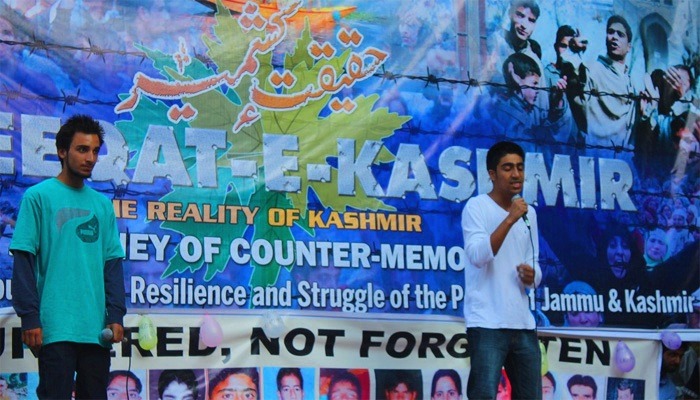Social Media
-
Rural Social Media and ‘Timepass’: Theorising Non-Instrumentality
[W]e first need a language to entertain the thought of entertainment as a valid if not serious use of technology which is worth studying… [M]y preliminary findings have convinced me that the potential banality of terms like development, e-governance, digital literacy, technology adoption, innovation and even Jugaad, does not allow one to grasp the wider cosmology in which digital media is being appropriated in the village.
-
Hashtag #StingOp: Truth, Low-Resolution and Post Social-Media Transparency
This project begins by considering the various (ever-mutating) physiognomies that have been deployed for the manufacturing of these video documents. It sketches the techno-material history of the production of the sting – from the changing optical devices used beginning with the large camcorders concealed in satchels used during earlier stings like Operation Westend, Gujarat riot stings etc. right up to the latest high-resolution spy-cams disguised in eye-glasses, diaries, calendars, ear plugs and various other innocuous seeming subjects to the complex processes in post-production. I am deeply interested in the careful technical packaging of the sting video … [and] the various post-production effects often deployed to accentuate the sense of authenticity/truth to the sting footage.
-
Aims and Faces behind Kashmir’s Alternative Media
The saying, “In war, truth is the first casualty,” holds true to Kashmir. There are multiple versions of a single event and there is no absolute truth. Also, being a disputed conflict zone, there is limited space for freedom of speech and freedom to express ideas. Thus the rise of alternative media is significant. Hence, it is important to reveal the story behind its rise and the story of people who gave birth to it and what they aim. It is important to put into perspective why these activists chose this path.
-
Digital Histories of Partition: Memory, Archives and the Narration of a ‘South Asian’ Identity Online
By focusing on the transnational South Asian histories, national and diasporic identities negotiated online through Partition-related narratives and archives, this project will interrogate the effect of new media technologies on South Asian memory and history. Memories of Partition stand at the crossroads of the personal and the political, by being a personal tale of displacement and trauma that is also simultaneously a constitutive moment in the construction of national identity and the birth of the nation-state. This dissonance is exemplified in the digital archiving of memories and histories of Partition.
-
Digital Divide, Online Offense: Malayalee House, “Pandit Phenomenon” and Morality Debates in Contemporary Kerala
My project looks at two contemporary phenomena in the Kerala mediascape — the emergence of “internet celebrity” Santhosh Pandit, and the recent reality TV show, Malayalee House, both of which have been amplified by the digital-social media’s potential to unsettle intended trajectories and uses of media circulation. In corollary, these have also inaugurated new ways of thinking about what it is to be a “media celebrity” in Kerala.
-
The So Far of ‘Shooting with the Interface’
Users access the web through the interface generating an event, captured as a log in the server. Millions of these events get parsed through filters to be analyzed on dashboards, another interface. Dashboards then optimize the user facing interface to streamline and increase the number of events happening… I was interested to find out if there were more ways in which an interface mimics the camera.
-
Situating Social Media in Rural India
While the problems of technological determinism, digital divide and the larger politics of knowledge and development are multifaceted and evoke extreme opinions ranging from technophilia to dystopia, there are some key ideas like interpretive flexibility of technology and context sensitive appropriation and access, which could help us engage in a nuanced debate on the relationships of society and technology. In case of ICTs, the interpretive flexibility is further problematized by their ability to liquidate space and time.
-
Mobile Phones and Media Consumption Practices: A Brief Introduction to the Project
This project tries to understand the changing socio dynamics of access to media content in India with the spread of mobile phones, and intends to trace the new techno social networks of users and other actors that form to gain such access. The research focus will be on users and user groups with limited technological means and access (such as security guards, auto drivers and vegetable vendors etc).
-
Short Term Research Projects in Social Media: Selected Proposals
The Call for Proposals for the Short Term Research Projects in Social and Digital Media attracted over 80 applications from all over the country, and it took a careful scrutiny of all the applications to reach our decision. We got applications from scholars as well as practitioners, young researchers and older, and proposals looked at a wide range of themes. Please take a look at the excerpts from selected proposals for this year’s Short Term Research Projects in Social Media.
-
Call for Proposals: Short Term Research Projects in Social and Digital Media
The Sarai Programme, Centre for the Study of Developing Societies, Delhi, invites proposals from individuals for research projects on contemporary social and digital media, its ecologies and histories. Research is supported by a project grant from the Indian Council of Social Science Research.




